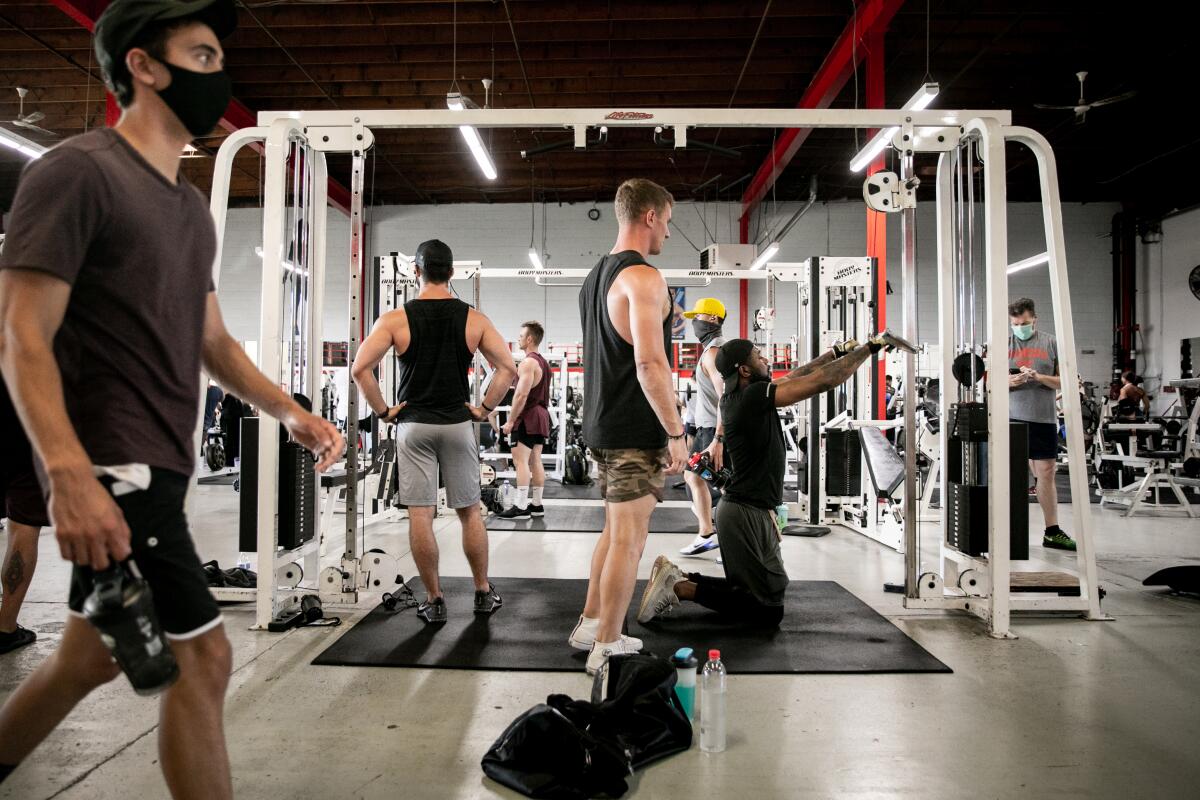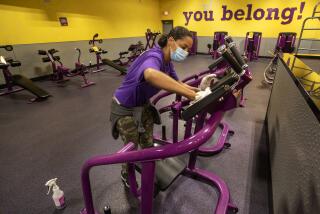San Diego County businesses defy second shutdown order; county strike force mobilizes

SAN DIEGO — Shawn Gilbert is not shutting down. Not again, after losing tens of thousands of dollars during the first government-mandated closure of his University Heights gym, Boulevard Fitness.
Not even after getting a visit Thursday from two San Diego police officers, who were checking out his facility after reports that Gilbert had stayed open against state and county orders.
Gilbert, the son of Irish and Italian immigrants and blue-collar workers in Boston, said he’s been working toward small business ownership since he was a teenager. At 18, he began working in low-level gym jobs, peppering his bosses with questions about how they made their business successful.
Now, with 25 years under his belt in the fitness industry, he’s at his limit with Gov. Gavin Newsom’s latest order to shut down gyms again, barely a month after he reopened.
“If I closed again, there’s a possibility I’d have to close these doors forever, and I’m not going to let that happen,” Gilbert said. “I’ve worked nonstop, taking virtually no sick days, to build something up from nothing. I won’t let it get destroyed.”
Boulevard Fitness remained open Thursday, even though San Diego County ordered all gyms, salons and other personal services to close as of midnight on Tuesday.
Gilbert is not alone in that decision. At least two gyms in north San Diego County also remained open: Metroflex Gym in Oceanside and the Gym Vista. The owner of the former, Lou Uridel, became a bit of a local celebrity after he was arrested in May by Oceanside police for reopening his gym against the county’s health order. Uridel was released the same day and has a court hearing scheduled for September.
As these businesses and others — from salons to churches — push back against county and state regulations meant to slow the spread of COVID-19, some are questioning whether the county’s education approach to enforcement is working. Although county officials have ordered a handful of businesses to close, they have largely relied on community members and businesses to adhere to a sort of honor system — an honor system some businesses feel is built on faulty regulations that unfairly impact some more than others.
But the county has long stressed that these regulations are what’s needed to slow the spread of the coronavirus.
Thursday’s COVID-19 report was a study in contrasts. While just 4% percent of the 10,434 test results that the county health department received Wednesday were positive, adding 409 new COVID-19 cases to the regional total, the number of current hospitalizations jumped by 34. The increase pushed the total number of people with the disease currently in hospital beds to 500, just eight fewer than the local pandemic record set on April 1.
It is becoming clear that San Diego County is starting to see more severe consequences after overall case totals spiked a few weeks ago. For the third straight day, the health department announced COVID-19-related deaths in the double digits. Seventeen were announced Thursday with 12 on Wednesday and 14 on Tuesday.
As of Thursday’s COVID-19 report, there had been 83 COVID-19-related deaths in July. Given that the month is only half over, the current pace appears to be the fastest so far. If July continues to see deaths at its current pace, it will pass the 160 mark by the end of the month. County records show there were 147 COVID-19 deaths in May, 128 in April, 91 in June and 16 in March.
With these sorts of numbers as a backdrop, a new picture of enforcement has emerged — one involving state and local “strike teams” that will be tasked with cracking down on rogue businesses.
At the beginning of the month, Gov. Gavin Newsom announced the creation of teams from 10 state agencies creation of teams from 10 state agencies that would be tasked with enforcing regulations imposed during the pandemic. On Thursday, county officials confirmed that these teams are actively operating in the region.
County officials also announced this week that they will be creating strike teams of their own. It’s still unclear how those teams will operate, but they would be similarly charged with investigating any complaints about noncompliance involving businesses or other locations, Dr. Wilma Wooten, the county’s public health officer, said Monday.
But will those teams be more able to persuade businesses to close their doors, even as some owners dig in their heels?
Uridel reopened his Oceanside gym two days after his arrest, after an anti-shutdown demonstration in his parking lot, and has been open ever since. He’s invested in new cleaning and disinfecting equipment, spaced equipment apart, and limited the number of people who can be in the building at once.
Masks were mandatory briefly until someone passed out and injured himself while wearing a face covering and lifting weights, Uridel said. Now masks are optional. About 20 people could be seen working out inside the gym Thursday morning. Hardly anyone wore a face covering.
Uridel said he has no intention to shut down his business again.
“We’re not light switches,” he said, explaining that his business can’t just be switched off and on. Employees need training, experience and steady work, and when their employer shuts down, they find another job.
A collection of San Diego gyms, including Boulevard Fitness and Metroflex, have banded together to fight what they perceive as an unfair mandate. Several of the gym owners have consulted the same attorney, and they plan to sue if officials try to shut them down.
“The last thing we want to do is file a lawsuit,” said Gilbert of Boulevard Fitness. “But this is about protecting what’s ours. We’re not millionaires. That’s the perception people have about small business owners, but it’s completely wrong.”
Gilbert said he was denied help from multiple lenders, not qualifying for assistance from the government-backed Payroll Protection Program loan, nor the Economic Injury Disaster Loan — two programs meant to keep small business owners alive during closures.
In Vista, the Gym Vista reopened May 7 and was busy Thursday morning. Patrons were not wearing masks. The manager said there were no plans to close but declined to discuss the situation further.
It’s not just gyms that are fighting the latest wave of shutdown orders.
Hair salons — businesses also ordered to shut down this week for the second time — are getting more vocal about their own resistance movement. A federal lawsuit was filed on behalf of hairstylists and salon owners against Newsom in May, alleging the governor had unfairly kept them closed. The lawsuit represented over 500,000 licensees via the Professional Beauty Federation of California.
“There’s a lot of anger in our industry right now,” said Gayle Fulbright, owner of Headlines The Salon in Encinitas.
Fulbright is closing her salon until she can get the green light from state regulators to operate outdoors. But she understands the urgency felt by her peers who feel closure is not an option.
“We already lost three salons up here in North County during the last shutdown,” Fulbright said. “I think some will take the risk or don’t care.”
Officials with the San Diego Police Department have long preferred to issue warnings and otherwise educate the public about the rules versus issuing citations and making arrests.
“We will not be able to enforce our way through this pandemic,” said police spokesman Lt. Shawn Takeuchi. “What we are asking for is cooperation from the community and for the community to take responsibility to stop the spread.”
Meiling, Winkley and Diehl write for the San Diego Union-Tribune. Staff writers David Hernandez, Karen Pearlman and Paul Sisson contributed to this report.
Kansas congressman forced to leave committees after charges
Germany: Black Forest fugitive held after 5 days on the run
More to Read
Sign up for Essential California
The most important California stories and recommendations in your inbox every morning.
You may occasionally receive promotional content from the Los Angeles Times.













